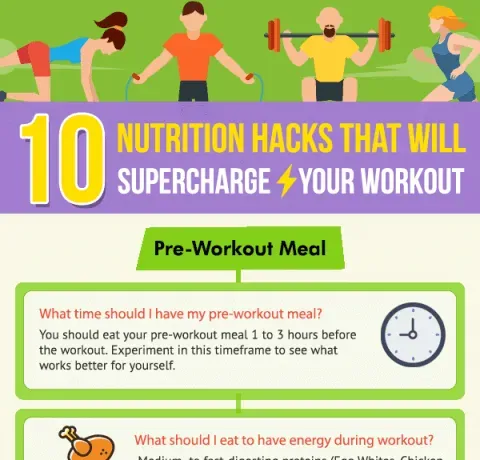Sports nutrition hacks are practical, science-backed strategies you can apply every day to fuel for peak performance and support your training. By following clear sports nutrition tips, athletes can optimize energy, hydration, and recovery without overhauling their entire lifestyle. Key pillars include pre-workout nutrition, fueling during training, and protein timing and recovery to support muscle repair and adaptation. A science-based approach to hydration for athletes helps protect performance in heat and sustain daily training loads. This introduction sets the stage for practical, sustainable tweaks—small, repeatable changes that accumulate toward better energy, faster recovery, and consistent progress.
Sports nutrition hacks for peak performance
Sports nutrition hacks turn the science of fueling into practical daily wins. The core idea is consistency: small, repeatable adjustments to meal timing, carb quality, and protein placement add up to bigger gains in energy, endurance, and recovery. When you frame nutrition as a steady routine rather than a perfection quest, you create reliable fuel for peak performance that supports you through tough workouts and longer events.
Key components of these hacks include smart pre-workout nutrition to top up glycogen and keep you sharp, deliberate protein timing and recovery to support muscle adaptation, and hydration for athletes to protect performance in heat and during demanding sessions. By weaving these elements together, you build a fueling framework that travels with your schedule—whether you’re in-season, traveling, or recovering between sessions.
Hydration and fueling strategies for athletes
Hydration for athletes is a performance-critical variable, not an afterthought. Start hydrated, sip regularly during exercise, and tailor electrolyte intake to climate, duration, and sweat rate. This practical hydration strategy helps maintain plasma volume, regulate temperature, and sustain cognitive focus across long workouts and events.
Pair hydration with smart fueling around workouts: a well-balanced pre-workout nutrition plan 2–3 hours before training, steady during-exercise fueling for longer sessions, and post-workout protein timing and recovery to replenish glycogen and rebuild muscle. This approach aligns with the broader sports nutrition tips and keeps your energy steady, your muscles resilient, and your progress consistent.
Frequently Asked Questions
What are the essential sports nutrition hacks to boost performance and recovery?
Core sports nutrition hacks start with consistency: eat regular, balanced meals that provide carbohydrates, protein, and fats; use fuel for peak performance by timing carbohydrates around workouts; apply protein timing and recovery strategies after training to support muscle repair; stay proactive with hydration for athletes, and implement practical pre-workout nutrition and post-workout recovery steps. This evidence-based approach helps you train harder, recover faster, and stay on track across your season.
How can I apply sports nutrition hacks to a simple daily plan around training?
Build a repeatable plan: meals with a balance of carbohydrates, protein, and fats; a pre-workout nutrition strategy 2–3 hours before training (and a light option if needed closer to start); during longer sessions, quick carbohydrates and steady hydration; post-workout protein timing and recovery within 1–2 hours; and a proactive hydration strategy that accounts for sweat and electrolytes. This framework covers pre-workout nutrition, hydration for athletes, and protein timing and recovery to support peak performance.
| Key Point | Summary |
|---|---|
| Core idea | Nutrition is about consistency, not perfection. Small, repeatable hacks (meal timing, quality carbs, post-workout protein) add up over weeks and months. |
| Framework | Practical framework: fueling, hydration, and recovery to train harder, longer, and smarter without overhauling your lifestyle. |
| Foundations: energy systems | Peak performance comes from matching energy availability to training demands: carbs for high‑intensity work, fats for longer efforts, and protein for tissue repair. |
| Macros, timing, and fueling | Carbs power performance; protein supports repair and adaptations; fats provide dense energy. Target daily amounts with timing around workouts and adjust to training load. |
| Hydration and electrolytes | Hydration strategies matter for performance. Monitor body weight, thirst, and urine color; use electrolytes for longer sessions or heat; rehydrate with electrolyte beverages. |
| Pre-workout nutrition | 2–3 hours before: carbohydrate‑rich meal; 30–60 minutes before: easy-to-digest carbs if needed; morning workouts may use quick carbs or fluids. |
| During exercise fueling | For sessions >60 minutes or hot conditions: carbohydrates via drinks, gels, or snacks; consider small protein amounts in longer sessions; hydrate with thirst-guided fluids and electrolytes. |
| Post-workout recovery & protein timing | Within 1–2 hours after training: 3:1 to 4:1 carbs:protein to replenish glycogen and support repair; distribute protein across meals (20–40 g per meal) and prioritize recovery sleep. |
| Supplements | Caffeine (3–6 mg/kg pre‑exercise, not late in the day), creatine, and convenient protein options can help when used wisely; supplements aren’t required and should be evidence‑based. |
| Personalization | Turn hacks into a practical plan that fits your sport, schedule, and preferences. Track intake and training load, experiment, and adjust gradually. |
| 1‑day plan (practical example) | Sample day includes balanced meals, pre‑workout snack, during‑exercise fueling, post‑workout recovery, and hydration throughout. |
| Bottom line | Sports nutrition hacks are practical, flexible, and effective for building a consistent fueling routine that supports training and progress toward peak performance. |
Summary
Conclusion: Sports nutrition hacks provide a practical, science‑backed path to better performance through steady fueling, smart hydration, and proactive recovery. By focusing on consistency rather than perfection, athletes can tailor fueling and hydration to their sport, schedule, and preferences, building a sustainable routine that supports training quality, energy, and long‑term progress.

